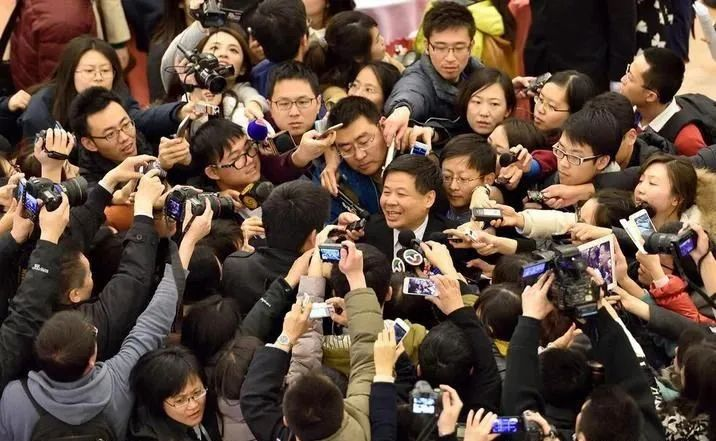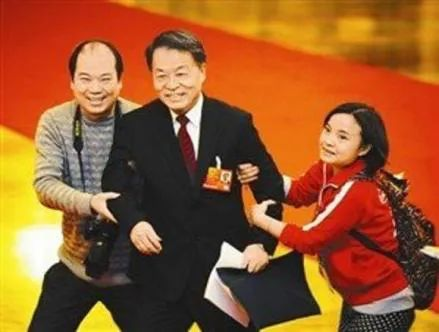A number of recent events have brought renewed attention to the diminishing role of investigative journalists in China, and to the many impediments they face in their work. Following this month’s announcement of the elimination of the Chinese premier’s customary press conference held at the conclusion of the National People’s Congress (NPC)—a thirty-year journalistic tradition—many journalists and media watchers bemoaned the demise of that rare opportunity for the domestic and international press to interact with high-level Chinese officials, even in a semi-scripted capacity. More recently, journalists from state-media outlets China Central Television (CCTV) and China Media Group (CMG) were prevented from reporting at the scene of a gas leak and explosion that killed seven and injured 27 in the town of Yanjiao, Hebei, located near Beijing. The unusually aggressive local government interference with Party-controlled media generated much discussion online, with one commenter noting that in this case, the Party seemed to have “muffled its own mouthpiece.” The incidents in Yanjiao prompted the All-China Journalists Association to make a rare statement in support of press freedom, and municipal officials in Sanhe (Yanjiao is under the jurisdiction of Sanhe city, Hebei province) issued an apology for the heavy-handed tactics.
CDT Chinese editors have archived a number of censored essays and articles related to the state of journalism in China. Three in particular are worth noting, due to their connection to recent events, the perspective they offer on the decline of journalism in recent years, and the fact that they were considered controversial enough to be targeted by censors.
The first censored article, originally posted to WeChat by journalist and current-affairs commentator Zhang Feng, discusses what was important about the premier’s now-defunct press conference, and what it meant to journalists, readers, and television viewers alike:
Everyone knew that the first few questions would be pre-selected, would involve a lot of data, and would be asked by state-media outlets. In the middle part, commercial media outlets would have their chance to ask questions, and at some point, so would foreign media outlets. Many observers looked forward to the questions by foreign media, because they gave the impression of being unscripted and unexpected. (Actually, the foreign media were usually quite polite and didn’t put people on the spot too much.)
The occasion had a bit of a holiday feel, and there was a tacit understanding that no one should ruin the “holiday” atmosphere. This applied even to the interpreting and B-roll footage, which often sparked some lively discussion.
During this “holiday,” the questions and answers were a ritual in themselves, signifying communication and persuasion rather than [the usual] one-sided government pronouncements.
[…] Expectations were fairly low, and no one was naive enough to expect any truly embarrassing questions. What people did look forward to, though, even with everything being well-rehearsed, were the occasional unscripted “accidents” during the “live performance”— a few flickers of light, a few interesting moments.
On these occasions, each little “accident” ultimately proved to be lovely, because such moments are imbued with more humanity.
This is the truth in the age of mass media. A great deal of trust and consensus are generated from this sort of interaction. A smile or a gesture can convey a far more powerful message than government policies or official documents. The real secret lies in the interaction itself. [Chinese]
The second article, archived by CDT editors before it was deleted, was posted by WeChat account 衣者褚 (yī zhě chǔ). In it, the author recalls the lively post-NPC press conferences of the past, in which journalists would often chase officials and delegates for interviews, sometimes cornering them in restrooms or grabbing their arms so that they could not escape. Even snatching microphones from journalistic colleagues was not unheard of. The author recounts a March 2012 incident in which he grabbed a microphone not meant for him, in order to ask a question of Party Secretary of Chongqing Bo Xilai (who would later be tried for corruption and imprisoned for life) about “negligent supervision” of his former police chief, Wang Lijun:
The situation at this year’s Two Sessions is really very different from what it was in years past. Back then, having your feet trampled on, losing your shoes, and cameras being knocked over were common occurrences.
In that era, when reporters encountered provincial or ministerial officials, they would chase them down and surround them. Whether it was in an elevator, a committee room, or a conference hall, if they ran into a newsworthy official, the journalists would pull out their voice-recorder pens and rush forward to pepper the official with questions. Sometimes a crowd of reporters would even follow an official to the restroom, and wait outside to intercept him when he emerged.
Around 2008, then Party Secretary/Deputy Minister of Health Gao Qiang stepped out of a meeting for a bathroom break. When he emerged, he found the restroom entrance blocked by a crowd of reporters clamoring for an interview. Gao Qiang sighed and said, “I’ve spent years being blocked in here by reporters.”
[…] Many veteran reporters still remember that journalist Zhao Qian was known as “Sister Minister-Blocker” due to the impressive physical strength and extraordinary patience she exhibited while covering the Two Sessions. She managed to corner any number of government ministers and cajole them into giving her an interview.
[…] In March 2017, I interviewed Zhao Qian about her years of journalistic experience. She recalled that back in the day, ministerial officials attending the National People’s Congress in the Great Hall of the People would enter through the North Entrance of the North Hall. Since it was the only way for government ministers to enter the venue, the press had privately dubbed it the “minister’s passageway.” “At that time,” Zhao Qian told me, “when a minister was stopped by a reporter, all the other reporters would crowd around him, making it hard to escape. Sometimes the ministers would emerge from the scrum with their hair and clothes in complete disarray.”

An official caught in the middle of a press scrum.
In 2013, the government set up an official “minister’s passageway” for use during the National People’s Congress. They installed a temporary “minister’s press podium” and loudspeakers in the North Hall, along with sets of bleachers to facilitate press photography.
Despite this, not all government ministers were willing to be interviewed by the press, so media outlets would dispatch reporters to the meetings to “escort” ministers to interviews. A common tactic was to identify your quarry, grab him by the arm, and hang on for dear life while trying to talk him into giving an interview.

Journalist Zhao Qing (at right) and another reporter (at left) cling to the arms of a potential interviewee.
[…] When the microphone was handed to a colleague next to me [during a March 2012 press conference], I took it. Thinking about it later, I realized that I had actually snatched it away. Before that, the colleague sitting next to me had seen that I kept raising my hand, and had asked me what question I wanted to ask, offering to help me out. He sounded very confident that he would have the opportunity to ask a question. But when I told him the question I wanted to ask, he told me he couldn’t help me ask that sort of question.
Although the person who had handed me the microphone whispered, “It’s not your turn. It’s for the reporter next to you,” I kept my grip on the microphone and asked my question.
[…] “Secretary Bo,” I asked, “You just admitted to ‘negligent supervision’ in employing Wang Lijun. So what I want to ask is, during those years you employed Wang Lijun, did anyone such as Mayor Qi Fan, Party Secretary Guang Lei […,] or anyone else on your team express a differing opinion or object to you employing Wang Lijun?”
[…] Bo Xilai replied, “Comrades, let’s not turn today’s press conference into a disciplinary inspection meeting!” Everyone laughed at this, and Bo also joined in.
Later, Bo said something to the effect that Wang Lijun had done a lot of fine work since becoming chief of Chongqing’s Municipal Public Security Bureau, scoring high marks in both job performance and public satisfaction, and that it had been a collective decision to employ him. He said that someone had, in fact, alerted him to some problems regarding Wang Lijun, and that he had met with Wang Lijun in person to discuss the criticism.
Unfortunately, I can’t find the footage of that. It seems to have been deleted. That was the only time I publicly asked Bo Xilai about Wang Lijun. If you happen to have that footage, I hope you can provide me with a copy. After the press conference, some people online complained that no mainland media outlets even asked about Wang Lijun. Lüqiu Luwei, who was at the press conference, later explained on Weibo that a reporter from the mainland media had actually asked that question. But because my question wasn’t permitted to be included in the official transcript or reported on, the outside world hardly knew about it. [Chinese]
Another now-deleted article, by former journalist and prolific WeChat blogger Meng Ge (Brother Meng), is a fond remembrance of the first time Meng saw the premier’s post-NPC press conference—when his political science teacher brought a television into the classroom so that the students could watch the press conference and prepare for their upcoming political science exams (the exam questions were based on key points from the press conference):
On the day of the premier’s press conference, the political science teacher brought his newly purchased TV into the classroom. We all watched the press conference and discussed possible exam questions.
Footage of that unusually lively press conference can still be found online. The reporters peppered Premier Zhu Rongji with questions, and his responses were very witty, sprinkled with memorable bon mots.
Our political science teacher suddenly pointed to the TV screen and said, “Wouldn’t it be great to be a reporter, to be able to interview the Premier in the Great Hall of the People?”
At that moment, his face lit up. Years later, I still remember that look.
And I thought to myself, “Hm, being a reporter doesn’t sound half bad.”
Years later, after various ups and downs, I did finally become a reporter.
[…] After I eventually left the newspaper business, I paid little attention to these [political topics]. Until yesterday, that is, when I read the news that this year’s premier’s press conference had been canceled.
That’s when I realized it had been over 20 years since I first watched the premier’s press conference.
I asked around and found out that my old political science teacher is still teaching at the school. If I have the chance to go back to my hometown this year, I’d like to look him up and have a drink together.
I want to tell him that dreams are truly precious. Even if they fall through at some point, that cannot dim their original radiance.
I also want to tell him what it’s like being a reporter out in the real world, and tell him all about reporting on the Two Sessions—the stuff they don’t teach you in textbooks. [Chinese]









